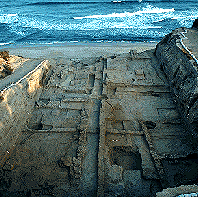I’m in the initial stages of writing a book about the
intersection of archaeology and Biblical Studies. More precisely, I am writing
on some of the most important archaeological finds for Old Testament studies.
You know, which find revolutionized the field? Which ones created new
paradigms? Which ones proved something about the Old Testament? As it is an
expansion of blog series I did for Wesley Biblical Seminary in the Fall
semester of 2017, the topics that will be covered range from Mari, Sennacherib’s
Annals, Ketef Hinnom, and others. You can read all about it here.
A by-product of this project is the need to fall-off-the-log
when it comes to my understanding of the relationship between archaeology and
Biblical Studies. What is the purpose of archaeology, and what is its
relationship to Biblical Studies? Is there a relationship? And what about the
popular term “Biblical Archaeology?” So, when I scanned my most recent volume
of Biblical Archaeology Review (43.3 [May/June 2017]) yesterday, I
quickly moved to William Dever’s article “Whom Do You Believe—The Bible or
Archaeology?”
Dever is one of the world’s most respected Syro-Palestinian
archaeologists, and certainly the most famous American. But more to the point,
I have found myself agreeing with a lot of what he says about the nature of
archaeology and its relationship to Biblical Studies. I was first exposed to
him during my Biblical Archaeology course during my post-graduate studies at
Asbury Theological Seminary. And truth be told, this article, although brief,
personal, and informal, reinforced my appreciation of the guy’s position.
One of the first things that peaked my interest came shortly
after he asked why reconstructing a history of ancient Israel mattered. He
initially gave the typical, non-offensive, cookie-cutter answer: “…because it
provides perspective.” However, he quickly went somewhere that I didn’t
necessarily expect. He also linked the answer to authority. Acknowledging “people
of faith” within the debate, he said, “Unless God is manifest in history…he is
invisible. It is ultimately a question of authority. What can we believe and what
moral imperative do we have” (p. 44)? Sure, Dever doesn’t necessarily align
himself here with people of faith, but linking the important of history,
particularly Israel’s history, with moral authority is an interesting, and ultimately
laudable, angle to take. I study history, particularly Israel’s history,
because I want God to be visible in real space and time. And when God is
visible, his authority becomes more difficult to brush aside and/or ignore.
Another important implication he offers is that archaeology
and Biblical Studies are two independent sources that must be synthesized in
the pursuit of historical Israel. “Both [archaeology and Biblical Studies] are
valuable, but both have obvious limitations. Beyond recognizing that fact,
sound method and honest require that these two sources for history be dealt
with independently and then compared. At that point, we have what I call “convergences”—points
at which parallel lines of evidence come together” (p. 44). Such convergences
sound like what I call potential “points of synthesis,” which are the phenomena
that construct Biblical Archaeology—the application of archaeological data upon
the Biblical Studies.
Many Evangelicals don’t like Dever, and I understand why.
Some people may criticize Dever’s historical pursuit of “ancient Israel” as naïve
and fundamentally flawed. I’m in neither of those camps. What I appreciate
about Dever is his ability and willingness to keep archaeology and Biblical
Studies separate and yet emphasize that in many instances the two disciplines
can augment each other in the pursuit of a common goal.
So, back to the title of the article. Whom do I believe? I believe
both, and I think Dever would echo this.

